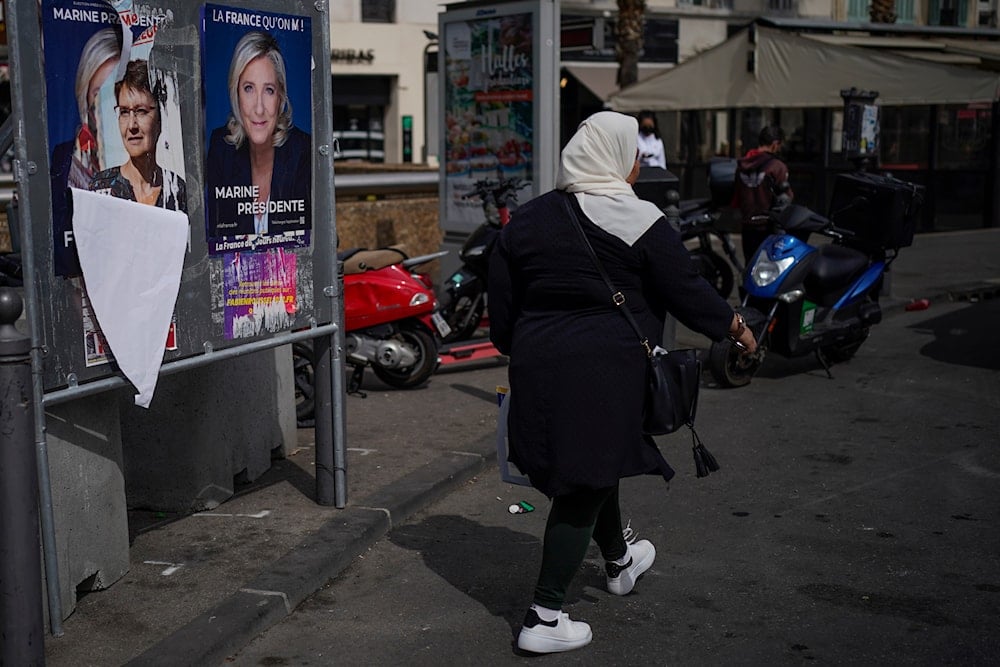'Israel's' Gaza attacks fueling Islamophobia across Europe: Report
A report highlights the increasing anti-Muslim sentiment in European countries, especially after the Israeli war on Gaza broke out.
-

A woman walks by presidential campaign posters in Marseille, southern France, on April 13, 2022. (AP)
A new report released on Saturday highlights a concerning rise in Islamophobia across Europe, linked to "Israel's" ongoing aggression against the Gaza Strip.
The European Islamophobia Report 2023 analyzes anti-Muslim sentiment in 28 European nations, revealing that the escalation of violence in Gaza has significantly fueled Islamophobia.
The report covered key developments such as the recognition of International Day Against Islamophobia in European nations, the rise in anti-Muslim sentiment triggered by "Israel’s" genocide in Gaza, and the proliferation of disinformation about Muslims in the media and online platforms.
Islamophobia in France
In France, the report highlights the exacerbation of institutional racism, particularly following President Emmanuel Macron’s pro-"Israel" stance in the ongoing war.
Kawtar Najib, who authored the section on France, wrote that the government’s ban on headscarves in schools instilled fear among Muslim students and their families, contributing to the institutionalization of anti-Muslim sentiment.
Najib also cited the police killing of 17-year-old Nahel Merzouk in June 2023 and the failure to hold the officer accountable immediately, a situation that sparked protests and intensified fears within the Muslim community.
Anti-Muslim sentiment in Switzerland
Switzerland also experienced a rise in Islamophobia, with researcher Nadia Lahdili highlighting that anti-immigrant sentiment has played a significant role in driving this trend.
There were 1,058 reported Islamophobic incidents in 2023, which included instances of racial discrimination and attacks targeting Muslims.
Lahdili also shed light on the challenges faced by Muslim women, particularly those wearing headscarves, who often encounter discrimination at their workspaces that hinders their career progression.
Anti-Muslim rhetoric in Bosnia, Herzegovina
Hikmet Karcic from Sarajevo University warned of a rise in radical anti-Muslim rhetoric in Bosnia and Herzegovina, particularly from Serbian nationalists. This rhetoric has fueled tensions, using hostile language to undermine Sarajevo's multicultural identity.
The report also noted the closure of several mosques and the construction of hotels on land originally designated for mosques, reflecting efforts to erase the country’s cultural heritage and intensify anti-Muslim sentiment.
Rising Islamophobia in Austria
Farid Hafez addressed the role of the United Arab Emirates in funding anti-Muslim groups in Austria, highlighting a rise in anti-Muslim rhetoric following the escalation of the Israeli attacks on Gaza.
The report also highlighted the suppression of protests against the genocide in Gaza, including Austria’s vote against a UN General Assembly resolution calling for a ceasefire. Additionally, schools in Austria held workshops on radicalization that, in some instances, promoted Islamophobic views.
The report emphasizes the troubling increase in Islamophobia across Europe, driven by political rhetoric, social media, and growing political polarization. It calls for more effective actions to address discrimination and safeguard Muslim communities throughout Europe.

 3 Min Read
3 Min Read








